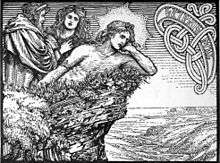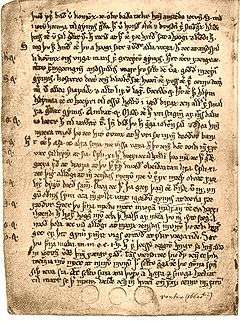Skírnismál

Skírnismál (Sayings of Skírnir) is one of the poems of the Poetic Edda. It is preserved in the 13th-century manuscripts Codex Regius and AM 748 I 4to but may have been originally composed in heathen times. Many scholars believe that the poem was acted out, perhaps in a sort of hiéros gamos.
Synopsis

The prose prologue to the poem says that the god Freyr, the son of Njörðr, sits in Odin's throne, Hliðskjálf and looked over all the worlds. On looking to Jötunheimr, the land of the giants, Freyr sees a beautiful girl and is immediately seized by love. Fearing that the object of his heart's desire is unattainable, gloom settles upon him.
The poem itself starts with the wife of Njörðr, Skaði, bidding Skírnir to ask of Freyr why he is so sad. Skírnir, fearing his master's wrath, nevertheless does as he is bidden. Freyr's response is sullen, yet he pours his heart out. Skírnir agrees to undertake a journey to woo Gerðr, and Freyr furnishes him with his magical steed and sword.
Skírnir duly fetches up in Jötunheimr, at the hall of the giant Gymir. Gerðr, the daughter of Gymir bids him enter the hall; without further ado, Skírnir tries to woo Gerðr on Freyr's behalf, offering first gifts then threats (in other versions Skírnir does not use threats but manages to successfully woo Gerðr). Eventually, Gerðr succumbs. Skírnir reports to Freyr, who asks him:
- Tell me, Skírnir, before unsaddling
- Or stepping forth another pace
- Is the news you bring from Jotunheim
- For better or for worse?
Skírnir replies:
- In the woods of Barri, which know we both so well,
- A quiet still and tranquil place
- In nine nights time to Njörd's son
- Will Gerd give herself.
Freyr responds:
- One night is long enough, yet longer still are two;
- How then shall I contend with three?
- For months have passed more quickly
- Than half a bridal eve.
Later, Skírnir speaks to Gerd:
- Seest thou, maiden, this keen, bright sword
- That I hold here in my hand?
- Before its blade the old giant bends,—
- Thy father is doomed to die.
- I strike thee, maid, with my gambantein,
- To tame thee to work my will;
- There shalt thou go where never again
- The sons of men shall see thee.
Cultural references
Skírnir's curse has partial parallels in a number of Old Norse texts, including the curse known as Buslubæn in Bósa saga and the Bergen rune-charm.[1]
The Misty Mountains of J. R. R. Tolkien's The Hobbit are likely to have been inspired by the úrig fiöll in the Skírnismál. Tolkien was familiar with the Poetic Edda.[2]
- ↑ Stephen A. Mitchell, ‘Anaphrodisiac Charms in the Nordic Middle Ages: Impotence, Infertility and Magic’, Norveg, 41 (1998), 19-42.
- ↑ Tom Shippey (2003), The Road to Middle-earth, Houghton Mifflin, ch. 3 p. 70-71, ISBN 0-618-25760-8.
Sources and external links
| Wikimedia Commons has media related to Skírnismál. |
Translations
| Wikisource has original text related to this article: |
- Skirnismol Henry A. Bellows' translation and commentary
- Skírnismál Bellows' translation with clickable names
Editions
- Skírnismál Sophus Bugge's edition
- Skírnismál Guðni Jónsson's edition
Scholarship
- Skírnismál as Ritual Drama Article by Rick McGregor
- Heinz Klingenberg, "För Skírnis: Brautwerbungsfahrt eines Werbungshelfers," Alvíssmál 6 (1996): 21–62 (see English summary, pp. 59–62).
- Anatoly Liberman, Review of Klaus von See et al., "Skírnismál": Modell eines Edda-Kommentars, Alvíssmál 6 (1996): 114–18.
- Anne Heinrichs, "Der liebeskranke Freyr, euhemeristisch entmythisiert," Alvíssmál 7 (1997): 3–36 (see English summary, p. 36).